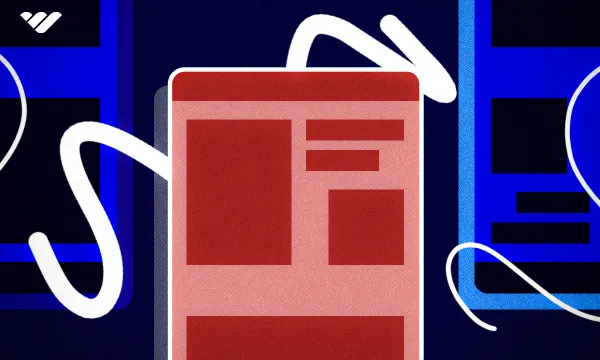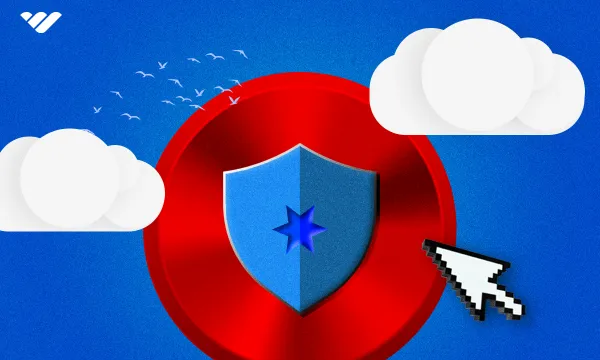Businesses come in all sorts of different forms, but they have a lot of things in common—one is the massive benefits to be gained by having an online community. This is going to be the case irrespective of whether you’re running a SaaS start-up, an ecommerce store, a YouTube channel, or even a publicly listed company.
An online community can increase the revenue and reach of your business in multiple ways. The closer relationship you can build with core customers via a community can cut down on product development time, increase sales, and boost the trust associated with your brand. A smaller business can multiply revenue by leveraging a community to add more income streams, and even a small hobbyist community can grow quickly and become monetized in multiple ways a little bit down the line.
This guide is going to show you exactly how easy it can be to set up an online community that can fulfill your goals and grow your business to the next level. Discover everything you need to do - from all the prep work and research you need, right through to creating an account on a top community platform and adding key features to your community.
Creating an Online Community: Before You Start
Before you jump into the extensive and highly rewarding process of creating an online community, it’s important to ask yourself, and then answer, three key questions. These will allow you to better define your strategy going forward, and help you find your way whenever you hit a crossroads.

Why are You Building an Online Community?
First things first, it’s paramount that you identify your own motivations for creating an online community. Yes, it’s a profitable endeavor and can create both direct and indirect revenue streams for you, but ideally, it should go beyond just that.
The fact that your community members are either going to be customers or potential customers is a given, but what’s important is that you’re bringing together people who have something in common. This shared interest allows community members to bond far more easily than otherwise possible for a bunch of strangers thrown into a room, real or virtual.
The genuine connections that get established in communities like these are often the point for the people who join, and it’s an effect that greatly enhances the learning journey that they’re on. Not every community is based around some sort of education, but people who join communities are almost always looking to develop their understanding or knowledge of the subject at hand.
A lot of extremely successful online communities get off the ground purely because of the fact that they bring together people who want to get in touch with others like them. The group organizers are almost always able to monetize, but sometimes that comes later.
Monetization itself can come in different forms. You might want to create a premium community to collect membership fees, but that’ll require a good reason—what are people getting for their fee? These premium groups generally come off the back of something else. Think along the lines of an influencer's community of hardcore fans willing to pay for closer access, or professional organizations.
A group of your own can give you serious benefits even if they’re absolutely free to join. It’s a readymade, highly motivated group of potential customers who already know and trust you, so it’s a great audience for digital products like ebooks or courses. It’s also a fantastic way to start building your influence in a certain domain, and start to be seen as a legitimate voice in an industry.
Wondering how to monetize an online community? Here's our ultimate guide to help you out.
What Sort of Community Do You Want to Build?
The next thing to think about is the broad type of community you’re going to set up. This one sounds obvious, but it’s worth putting some thought into because there are several types of communities, some of which can be extremely worthwhile if you’re a content or course creator. Let’s take a look:
- Learning community: A learning community generally refers to a community that brings together people with shared learning goals. It’s often an excellent complement to digital products like online courses because they activate things like social learning and peer-to-peer support. If you’re selling online courses, you might want to establish an online community for this reason alone, even if it’s just a simple forum or Telegram channel for your course participants to chat in. You’ll also glean lots of valuable information from your community members by staying in touch with them this way, and it could help you to develop more advanced courses or other digital products.
- Brand community: These are communities generally made up of customers, partners, and employees alike, and set up by brands to develop support structures and enhance all these stakeholders’ connection with the brand. Customers can gain from being part of these communities because they’ll receive additional support and know their voice is heard, and you as a brand can gain much deeper insights into your customers’ mindset through this channel. It’s all about retention at the end of the day, but the engaged, satisfied customers in your brand community can also evangelize on your behalf.
- Interest community: Plenty of online communities are formed around a common interest, hobby, or passion. These tend to be very niche, and if they’re devoted to a mainstream subject, generally tackle things in a unique way—it’s all about bringing the people who go against the grain together, in many cases.
- Action community: These online communities are formed to create change in some way, and you could even categorize global fringe groups like Anonymous or massive social change movements like Black Lives Matter as action communities.
- Geographic communities: There are tons of online communities focused on different places. These could be formed for different reasons, too—if you want to travel to a particular region, you might look for online communities that give travel tips or tell travelers what the best hangouts in the area are. You might also have groups set up by expatriates who want to get to know and interact with other expats, and they’re worth looking for if you’re relocating to another country—especially one where you might not know the language or how things work.
- Profession or practice-based communities: These are usually set up by members of a certain profession, and you’ll find them very useful–and popular–since networking within an industry and working toward the development of the profession and learning from each other is crucial in just about any field.
Deciding which one of these types of community to go with is very much up to you, but as we’ve hopefully made clear the distinctions are quite significant between them—and a lot of the time, it’s all down to the motivations of the group members first and foremost. By understanding what your members will get out of your community and whether that has value, you’ll be well positioned to move forward.
What is Success Going to Look Like?
Finally, you must try and define what exactly success is going to look like for you once the community is up and running. Not every community is going to be a revenue earner, and some communities might be very small and still successful. Others may entirely be based on accomplishing certain goals, so ensure that you set out your yardstick now to have something to work toward.
Many communities try to define a set of metrics to benchmark themselves and assess whether or not they’re successful. If you’re running a brand community, for example, you might be looking at things like your Customer Satisfaction Score and Net Promoter Score to see how happy your customers are and how willing they are to promote you to other people.
Whatever type of community you decide to run, it’s always a good idea to analyze your goals and set down a few metrics that’ll let you stay on top of your community and assess as objectively as possible whether it’s achieving what you set out to.
9 Steps to Building an Online Community

Now that you’re well-informed about the ins and outs of online communities and as prepared as you can be, it’s time to roll up those sleeves and get to work! Here’s how to build an online community, distilled into nine clear steps.
1. Define Your Community’s Purpose
You’ve already thought about why you’re setting up your community, so now it’s time to refine all of those ideas and formalize your goals—it’s even worth developing something like a mission statement that’ll remind you of why you’re doing this, and let members know what the core purpose of the group is.
If you do create a formal mission statement, you’ll want to include your target customers in it, the goals of your group, and why it’s going to benefit everyone involved. Something like “teaching newbie traders a solid trading system to help them earn a living from home” is basic but also powerful, since it says everything about the group in a single, neat line while clearly highlighting what members get.
One of the critical rules of marketing is to be as detailed as possible about who your specific target customer is, so “newbie traders” might actually not cut it. Rather, let’s think about upgrading that to “remote workers interested in trading”. That’s more specific, and it also establishes that you’re looking at people who will be spending time at the computers for an extended amount of time during the day, and hopefully have the ability and freedom to multitask.
The goals and benefits part of your purpose or mission statement is also critical. Remember how we said that people will be taught a trading system? Well, that part is critical, since people know that just about anyone can give them a series of arbitrary trading tips or simply throw knowledge at them. A system is different, it’s structured and organized, and suggests that people can up their chances of success by following it as closely as possible.
And of course, the part about earning a living from trading sets a frame for the potential earnings people can hope for from the system that they’ll be taught. This is realistic, and it’s also lucrative—who wouldn’t want to give up their day job if they could make the same amount from a few trades every day, or better yet, by deploying an automated system?
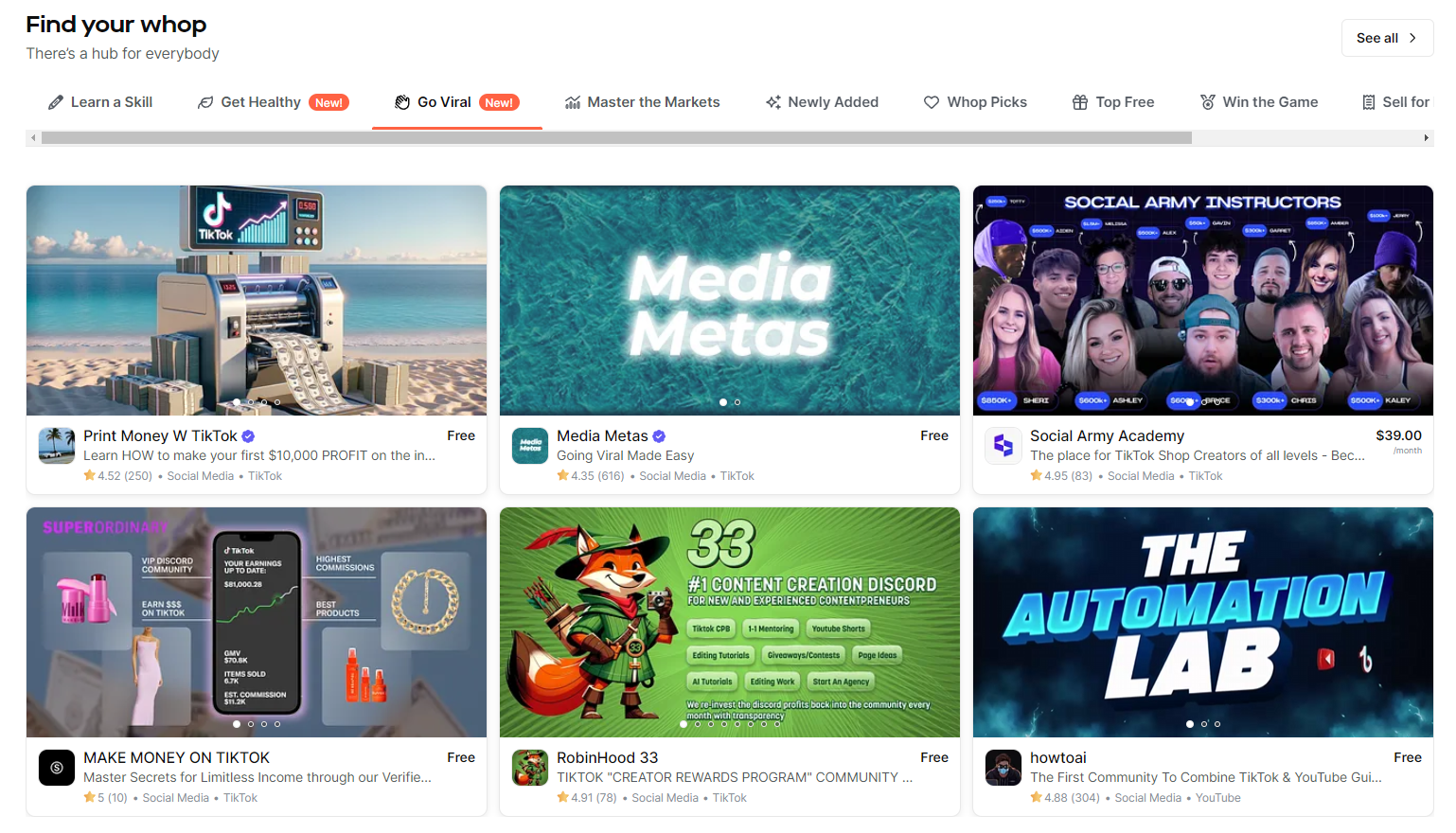
The businesses pictured above on Whop make sure you see part of their purpose even in a view such as this, advertising benefits such as tens of thousands in profit, promising you mastery of social media secrets and how to go viral, and marketing to a target market of TikTok creators of different levels.
The point is, a clearly expressed purpose for your community can really help to ensure that it stays on track as time goes on, while also giving members a clear idea of why they should join.
2. Identify Your Target Audience
We’ve already mentioned the importance of specificity when it comes to picking out a target customer, but that was just scratching the surface.
Ideally, you’ll want to go as far as creating what’s called a ‘consumer persona’ to reflect your core community member. This means looking at every aspect, from things like demographics–where they live, how old they are, how much they earn and so on–to behavioral aspects such as their attitudes towards various things, personality type, and even habits.
This kind of consumer research is traditionally done to be able to market to them via the most effective channels as well as meet their needs in product development. We’ll look at marketing later, but the product development side of it is the most crucial at this stage since you’re still in the process of developing your community.
The insights you glean from studying your ideal audience at this stage can help you make some very crucial decisions later on. Let’s say you’re teaching resume writing and interview skills to job seekers. Should you charge a fee for community membership or entry? The easy answer would be no, since logic dictates that a job seeker might be tightening their purse strings and minimizing expenses.
However, your research might point you down a different road. What if most job seekers are actually employed and looking to get promoted or want a similar job for more pay? Alternately, your target customer is an industry expert like a doctor or researcher, and you’re helping them move into the world of finance or an executive seat? You’d be missing out if you didn’t charge an absolute premium in either case.
In addition to these broader insights, you’ll be well served if you seek out ‘alpha’ members. We’re not talking about the alt-right Twitterverse here, rather the sort of potential community members or consumers who fit right into your ideal target group and have significant insights to share. If you’re in tech and alpha is an early adopter or someone who works in the field, in sportswear it might be a triathlete or pro runner, and so on.
Talking to a number of these people will give you the first-hand insights that you need to refine your concepts and ideas, and it’ll also help you gain an even better grasp of what your members’ goals and motivations are. It’ll also let you get deeper into the culture and the lingo, and help you to communicate with and market to prospective future members.
3. Outline the Community Structure
Next, it’s time to think about how you want your community to look in terms of structure. Every group needs some sort of structure to work, and it needs to be clear to members—whether you’re thinking about a round table-like structure that many Mastermind groups employ or a more hierarchical setup that looks more like a traditional corporation, defining it is critical.
You’re likely going to have a place in this structure as well, and it’s worth starting there. How big a part of your online business is this community going to be, and how much time and energy can you devote to it? Many entrepreneurs just starting tend to begin with a relatively flat structure with them heading the member group, but that’s going to be a lot of work as the community grows.
The first thing to think about is whether you want to have someone to manage the community for you. Whether you take on a dedicated community manager or sign up a couple of moderators, the help of these people will be invaluable since they’ll take care of a lot of the nitty gritty for you.
You’ll also need to think about customer support, whenever issues with your products or the community itself crop up. Deploying your own customer support can be expensive, and taking care of every member concern yourself is going to be exhausting—the right answer is usually to be found in the form of a community platform which can take over customer support on your behalf, but we’ll dive deeper into that later. For now, we’ll point out that having a highly responsive, always-available customer support team at your back can only be a good thing.
Lastly, you’ll need to think about whether you want to involve any of your other stakeholders in your community. If you’re running a brand community, for example, you’ll want your product development people in there so they can interact directly with customers and get feedback. If it’s a community centered around other digital products, get your marketing people in there so they can learn from your customers and see what works.
4. Set out Guidelines and Rules
We mentioned moderators in the previous section and, despite all the flak and memes that mods bear the brunt of online, you’ll find that they perform an utterly vital role in enforcing the rules and guidelines you set out for your community.
Let’s put it plainly for a moment here—people can, on occasion, behave quite poorly. You’ll see this in everyday life, and if people can’t stay on their best behavior in the flesh, those tendencies get even stronger when sat behind a screen, keyboard/touchpad, and the relative anonymity of an online handle.
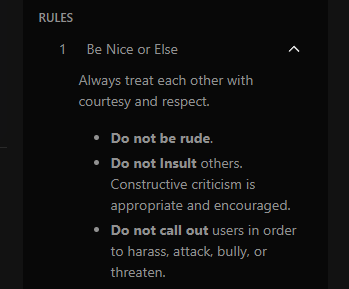
Just about every community of human beings needs to set out rules and guidelines in order to get ahead of any potential problem behavior that may arise later down the line. Most groups have a rule similar to the one pictured above right up at the top of the list, ensuring that members comport themselves to, at the very least, a standard of basic decency.
We’ve all heard stories of people behaving badly in groups, all the way to tales of politicians acting in exceedingly strange ways. While these might simply be allegations, people are undeniably capable of all sorts of things and you’ll want them to keep any such deviations well clear of your community!
Most online groups will want to keep the discussion to the area of general interest. Sure, you’ll probably want to designate certain spaces or areas, such as channels in your Discord server, for off-topic discussion, but the majority of your online domain should stay on topic and your guidelines need to specify that.
If you are going to employ mods, it’s also a good idea to mandate what they can and can’t do—that’ll alleviate any later claims of mods going on power trips. If your rules are black and white and they cover moderator powers, nobody can have any complaints later on down the line.
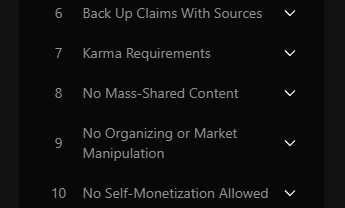
Rules like the ones above, taken from one of Reddit’s top finance subs r/Superstonk, are more specific to the niche, content quality, and even platform chosen. Karma is a Reddit thing and doesn’t apply elsewhere, but ‘no mass-shared content’ ensures that the community is kept free of misinformation peddled by various illegitimate sources on social media.
It’s also worth noting that you should add a rule forbidding discrimination and harassment to whatever else you have about appropriate behavior. You’d think it wouldn’t be necessary, but with the continuous shift of various prominent platforms toward embracing misinformation and hate speech, the internet’s not the nicest place anymore. Ultimately, you want your members to feel safe and appreciated in your community irrespective of who they are, where they come from, and what beliefs they might espouse.
5. Choose a Community Platform
We’ve already name-dropped Discord, Reddit and Telegram, and there are plenty more choices when it comes to exactly where you might host your online community. Each platform has its own set of distinct benefits, and some are more uniquely suited to different types of communities than others.
Platforms like the ones we mentioned, along with others such as Facebook Groups and LinkedIn, can be good choices to get started with since they’re all free to use. This means that there’s no monetary factor to consider and no barrier to getting signed up—and in several cases, the platforms have plenty of native users who might be able to find your community and join up through no (or not much) additional effort on your part.
However, these platforms have their own rules and regulations that you’ll have to abide by, and control is in their hands, not yours. Deplatforming is a risk that you’ll have to live with, and it can happen through no fault of your own. You might be able to make the rules and enforce them within your own group, but the platform itself is in ultimate control.
Furthermore, many of these social media platforms will bombard your group members with advertisements and other distractions, including calls to join other groups. It’s unrealistic to expect to monopolize your members’ attention, but there’s a lot of distraction on platforms like Facebook and Reddit.
A better option for your online community is a platform like Whop. It’s also free to use, only charging a small amount whenever people pay you, and puts you in full control of your membership group. Whop does offer discoverability, so you’ll score new members from Whop visitors via marketplace listing (if you choose to apply for the marketplace), but the number of distractions is massively reduced—Whop isn’t going to serve your members ads, nor will they be bombarded with other groups to join.
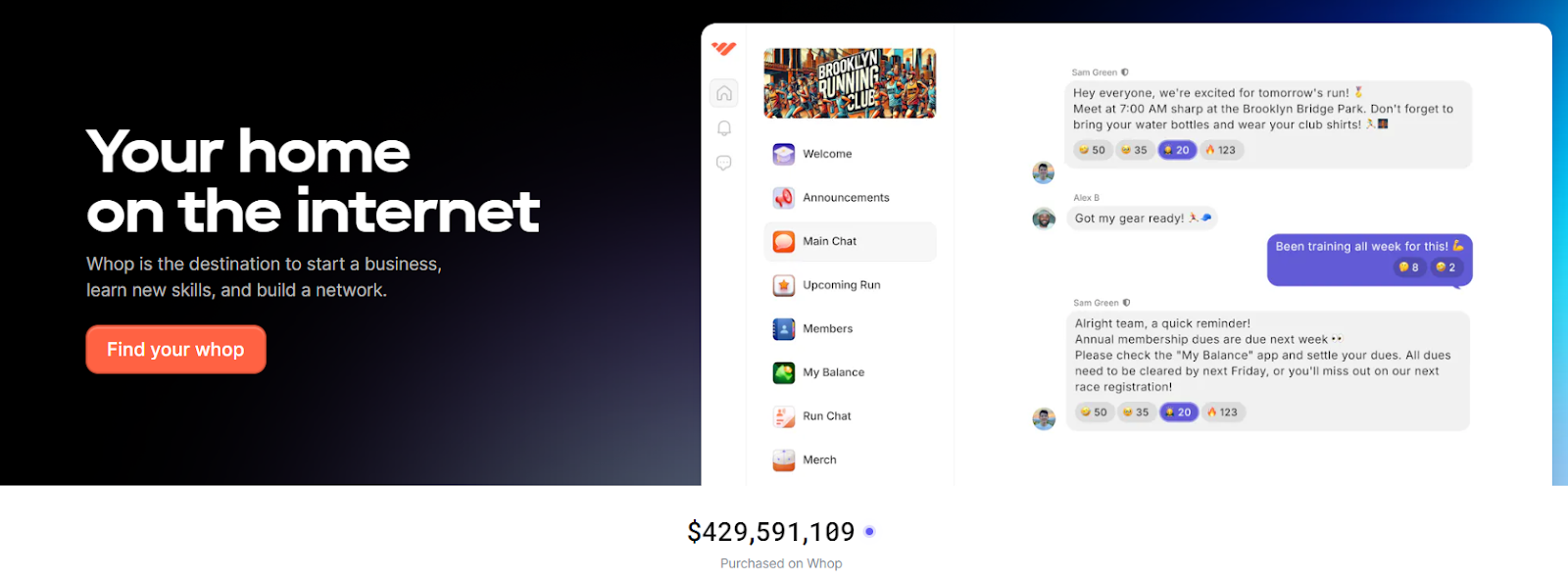
In terms of organization for your community, Whop reigns supreme. With Whop you create your own platform by adding the apps (features) that you want to your own whop. From chat to forums, live video to courses, you can create your community whop in any way that you like.
Plus, Whop takes care of customer service for you, with a response time of under three minutes and a satisfaction rate of 97%. It also serves as your payment processor, so you don’t need to worry about building your own ecommerce architecture on your website—all you really need to do with Whop is sign up, and you can set up your online community in just a few clicks.
We’ll get into that in detail in the next section!
6. Set Up Your Online Community
Now that you’ve chosen the perfect online community platform for your business, it’s time to get started. We think Whop’s an outstanding option, so we’ll use it to show you exactly how you can get started.
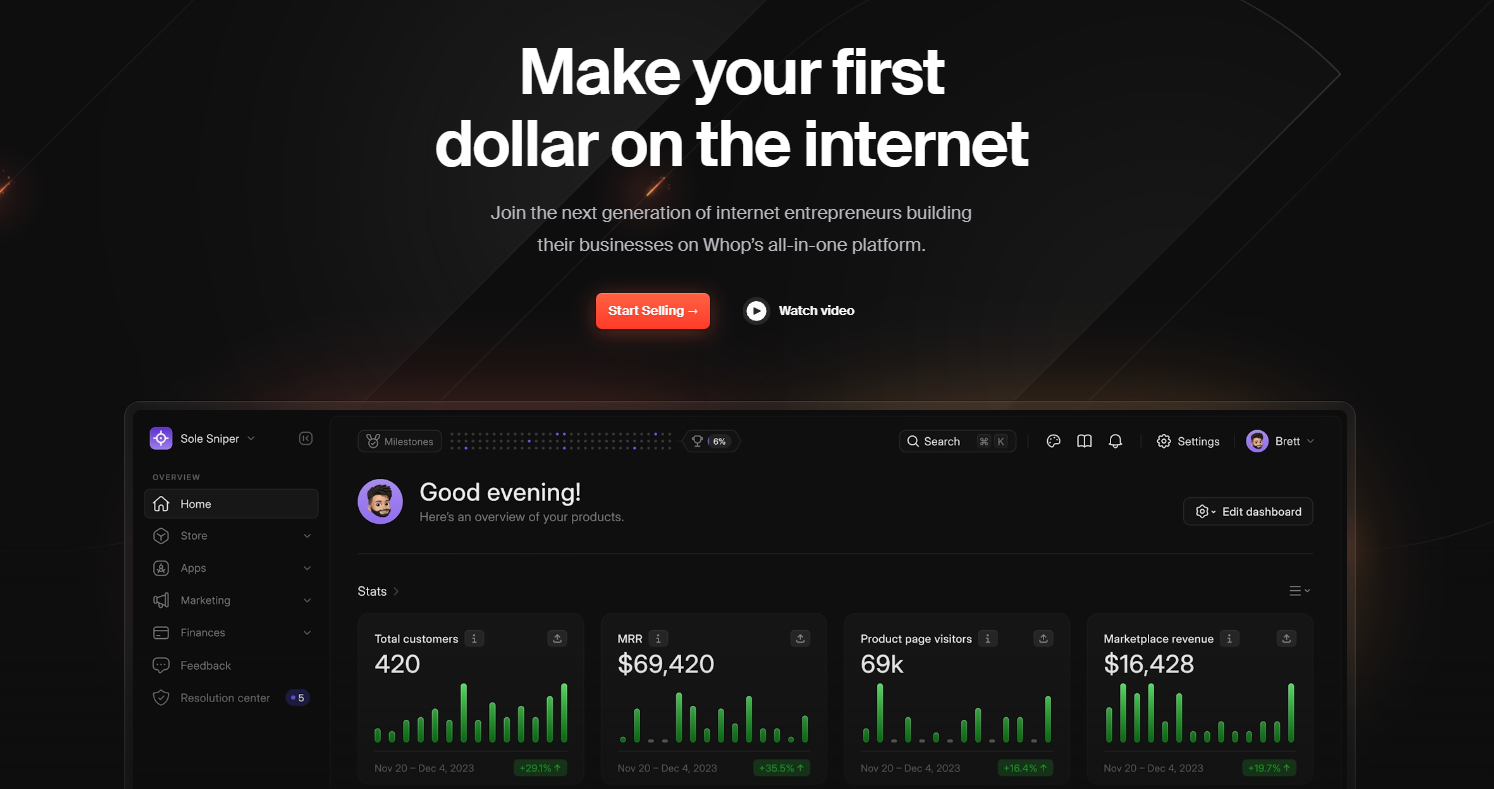
First things first, head to the website of your platform of choice and sign up. On Whop, all you need to do is click on that Start Selling button.
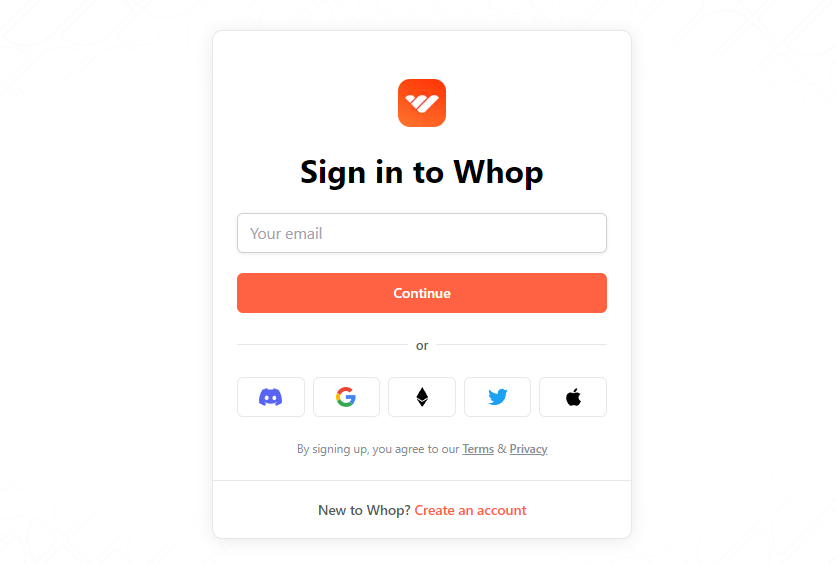
Now, you can click Create an account to get started if you want to use an email address to sign up. However, if you have an account with Discord, Google, Twitter/X or Apple, you can fast-track the process by clicking on the relevant icon. And yes, Whop now allows you to sign up with an Ethereum wallet too.
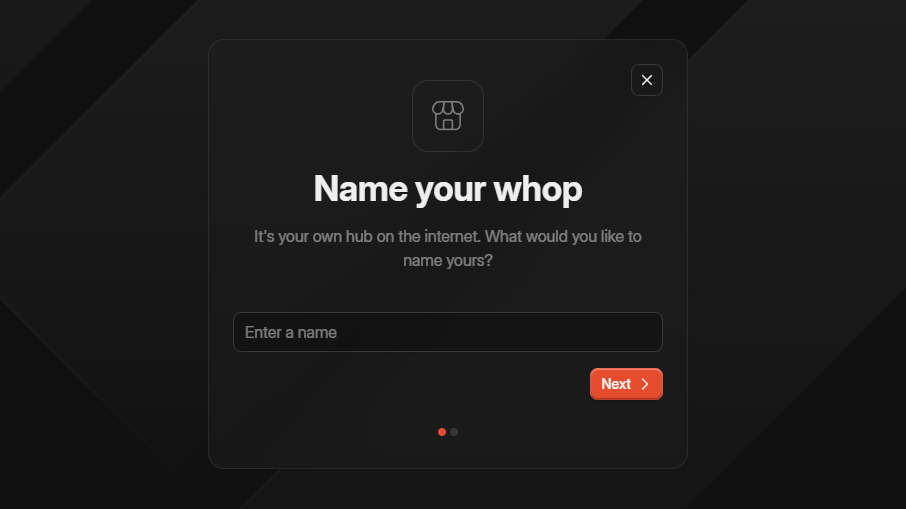
All you need to do is name your community and pick a category, and you’re all done. You’ll be taken immediately to your shiny new dashboard, which should look a little like this:
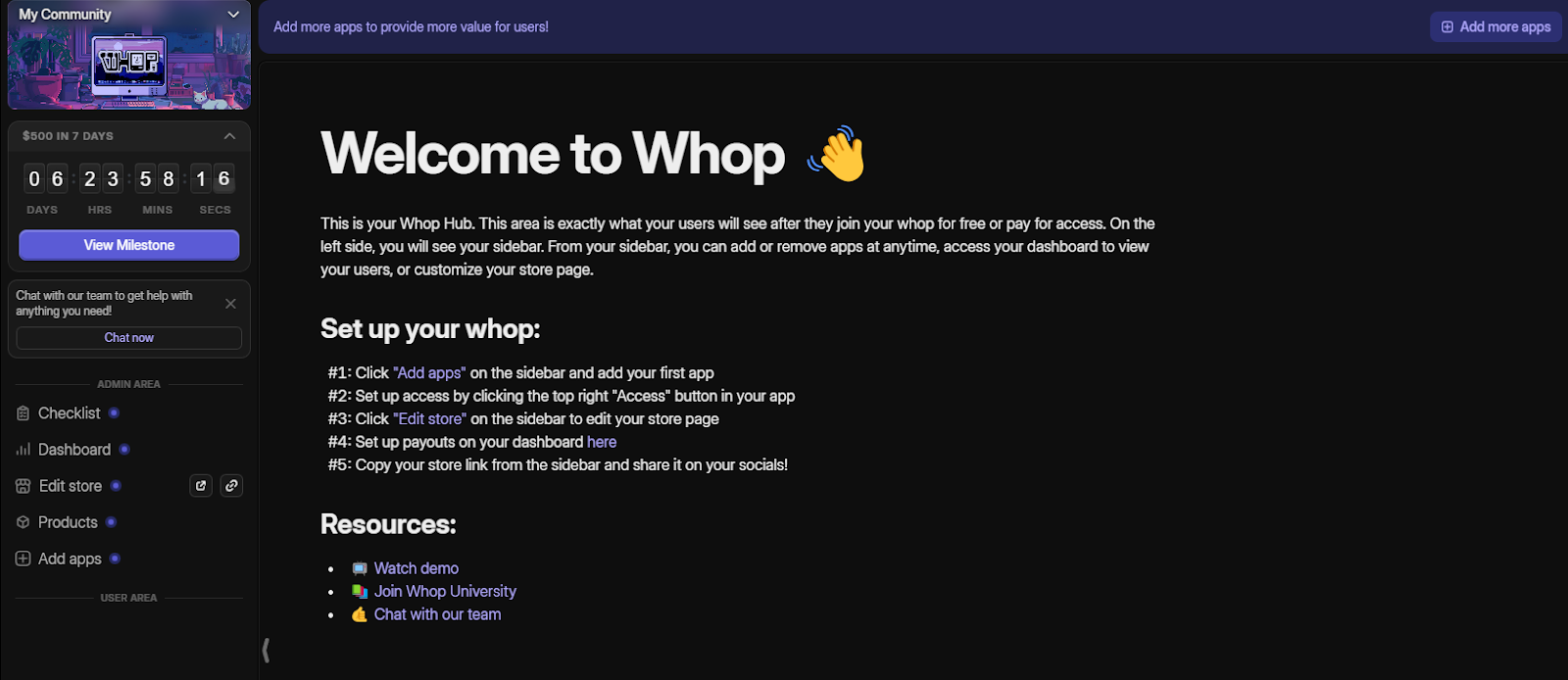
We’ll set up an example community for you a little later on, but getting started with Whop is just that easy, and a functional community is just a few clicks away. If you want, you can get in touch with the team at Whop through the link you’ll see on your dashboard and they’ll be happy to guide you through the process, and they’ll answer any questions you might have before getting started, too.
7. Begin Your Marketing Campaign
While getting your community’s building blocks in place, it’s also important to set your marketing plans in motion. The fact of the matter is that you can do everything else right, with an excellent platform and a solid purpose, but if you don’t ensure that people know about your community, it’s going to be crickets.
That being said, you’re probably building a community to support an existing business, digital product, or even your sphere of influence. This means you already have something of an audience, so it’s a good idea to start there. If you don’t, you’ll need to put this in place—for starters, try and get your website visitors to sign up for your newsletter, or get customers or prospects onto your email list.
If you have a social media presence and a bunch of followers on whatever platform, it’s even easier. Start well in advance, and get the word out that something’s coming—build up the awareness of your community well before launch, and get some hype out there. You’ll also get plenty of feedback right at this stage if you do, and that might inform decisions such as what features to include.
As you get closer to completion, keep accelerating your marketing, and promote your launch through every available channel once you have a firm date. Make sure your audience knows what’s coming, and incentivize them to spread the word. If your customers or followers spread the word through their own networks, you’re going to win big.
8. Launch Your Community
Finally, it’s time! With all systems go, it’s time to open your community’s doors, but you can do this in different ways. Some communities, especially those run by mature businesses, tend to go for a soft launch in order to control some of those metrics and work out some of the kinks prior to a full public launch.
Just how open or closed you make this initial soft launch is up to you—you could open up to internal stakeholders such as members of your team or even just trusted friends and associates first. If you’re looking at a much larger business model, launching in one geography might be the way to go, prior to going global.
If you do choose to go with a soft launch, you can give yourself a chance to fix any problems that your first group may identify. Look at it like the beta test of a product, and keep a very sharp ear out for any feedback these first community members may provide.
When you do go public, you’ll need to be everywhere at once—just think about an author when launching a book, or actors when a movie comes out. They're on every chat show and magazine they can get, and you should be doing the online equivalent of that by starting a discourse around your business and community wherever you can.
Podcasts can be a really good way to do this, they typically have small but extremely motivated and engaged listener bases so you can expect to convert quite well. Making an appearance on the right YouTube channels can also really help, and you can think about doing guest posts for blogs as well to get your brand and community out there.
9. Adjust, Adapt and Keep Growing
Hopefully you’ve got everything rolling smoothly by now, but it’s worth noting that flexibility and adaptability are key qualities when it comes to running an online community. It’s never going to be static, there’ll be an ebb and flow of members, and unforeseen challenges do often crop up despite the best laid plans.
Feedback from community members is probably going to be your best indicator of how things are going, and continuing to interact with them will let you make those little adjustments and tweaks you need to keep community morale as well as engagement up. Negativity and waning engagement are a death knell for any community, and it’s on you to stay on top of things.
Advanced analytics are the other end of the spectrum when it comes to keeping your community healthy, and again a top community platform can come in clutch in this regard. Platforms like Whop can help you keep on top of all of your numbers, showing you what you need to know in order to maximize member retention.
Launching an Online Community with Whop
We’ve already shown you how to get set up with your own whop to build your community easily, so let’s look at a couple of examples. Just as a refresher, here’s what your Whop dashboard will look like once you’re in for the first time:
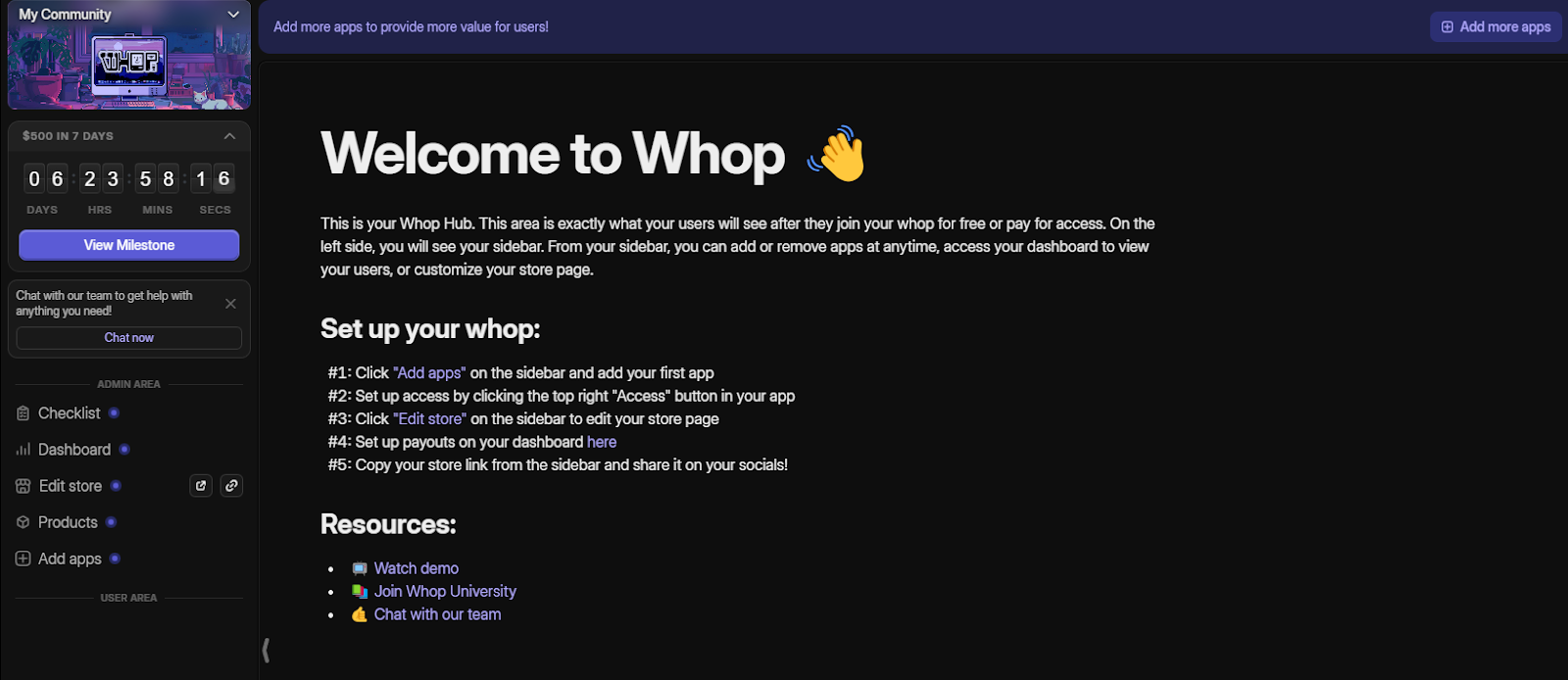
As you can see, Whop prompts you to complete five steps to properly launch your community. You should run through the lot of them, with number three being especially critical for your branding and number four essential if you want to take payments through your community or other digital products.
What we’ll focus on for now, though, is step one—Whop apps. When you click Add apps, you’ll see a list of different apps that you can add to your whop hub in a single click. Each of these apps empowers your community with the described functionality, so you can build your community exactly how you want it.
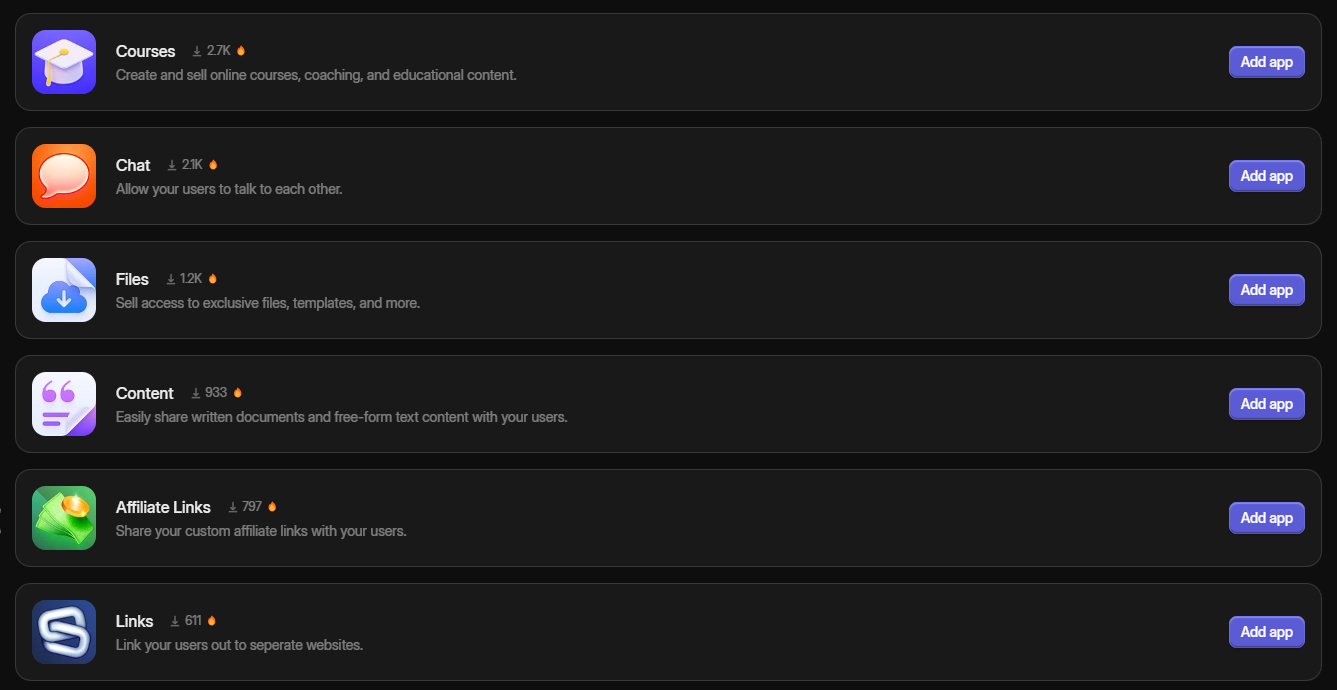
Trading Community Example
Let’s say you want to set up a trading community, with the assumption that you already share either your trading performance or some trading tips on your social media, be it Instagram, Twitter, or YouTube. Here’s what you might consider adding:
- Chat app: This’ll allow your members to communicate with each other in real-time, and you can shoot out time-sensitive messages to them during trading sessions.
- TradingView app: You might have developed a few TradingView indicators that you use as part of your trading system, and these will be a big part of what your community members sign up for—and they’ll be able to access them easily via this app.
- Software app: In addition to trading indicators, you might also have developed a trading bot. This app is one way to let members download your software, and you can use license keys to gate your software.
- Telegram app: You might already have a small community on Telegram, and adding this app will help you limit disruption since people don’t have to migrate over. You can use Whop to administrate your Telegram channel via this app.
- Video calls app: A lot of people will pay big bucks for one-on-one instruction from a trader they trust, so if you want to do something like this as a high-ticket item for VIP members, this app is the way to go.
Lo and behold, you’ve built a powerful community with a whole bunch of different features and monetization options with just five clicks.
Creative Community Example
Whop isn’t just a great choice for communities focused on things like trading. There are lots of different types of communities you can create, and there’s no reason you can’t monetize a creative community, whether that’s music, art, streaming, miniature painting, woodworking, or anything else. Let’s have a look at what apps you might use to set up a community around your creative endeavors:
- Forums app: Not all communication between members happens in real-time, so an app like Forums can let you set up different discussion threads that your members can communicate in.
- Affiliate links app: One of the best ways for creatives to monetize is via affiliate links—your community members might want to use the same paints that you do, the same camera, instruments that you’ve reviewed, or anything of the sort. This app lets you share your custom links with your members effectively.
- Files app: You might want to sell some of your prints, renders, designs, or really just about anything else—so use this app to do exactly that.
- Content app: If you want to share content such as a blog with your community, you can do that directly through Whop with this app.
- Courses app: As an expert in your field you’ll probably think about creating a course for people who want to learn to do what you do, so use this app to make it easy. Whop’s courses app is one of the most powerful on the market, including a full-featured and easy-to-use course builder.
It’s also worth mentioning that you can add multiple instances of each app, so you could sell multiple files and have chat channels for different topics. You can also rename each one, letting you fully customize your community to match your branding.
Build Your Community Today With Whop
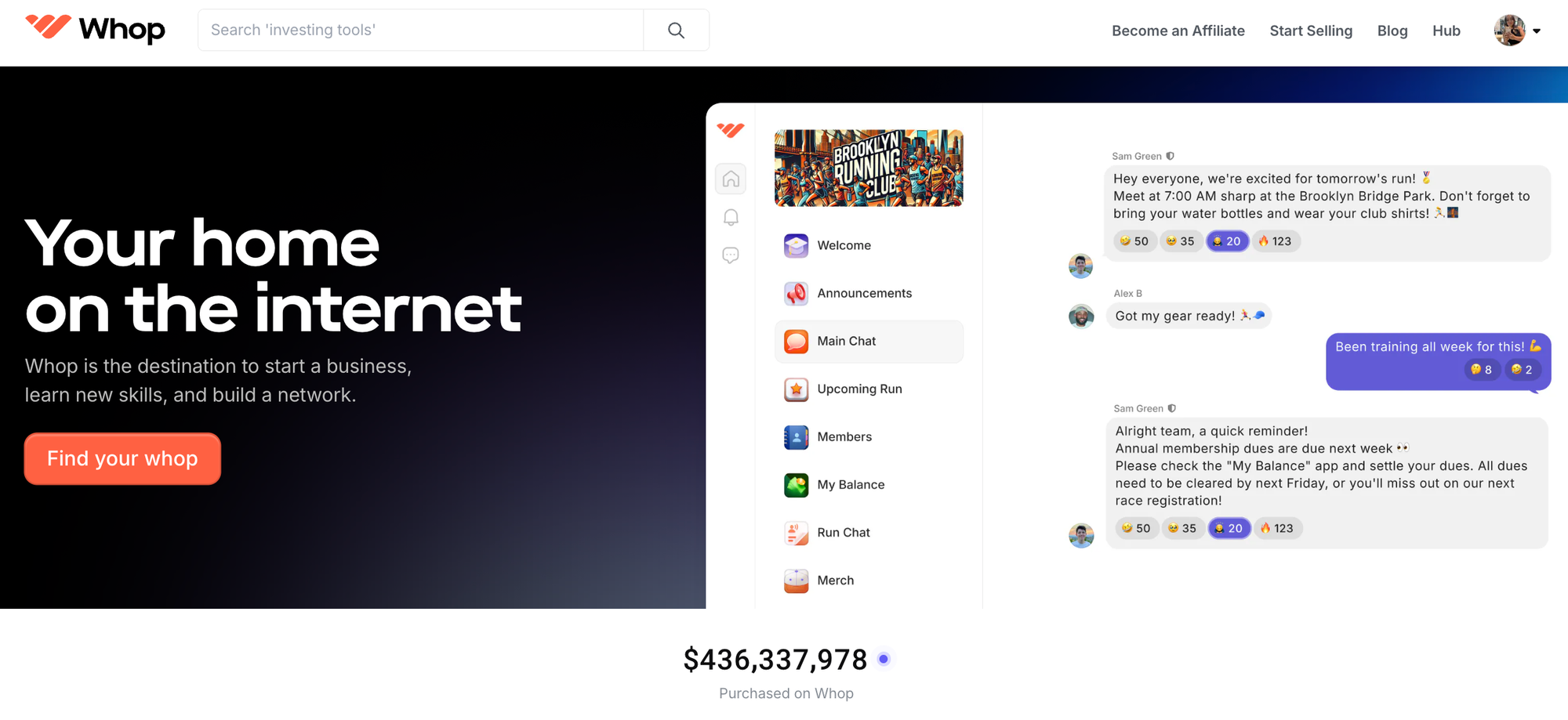
An online community can be exactly what you need to take your business to the next level, whether you’re a brick-and-mortar outfit, a digital entrepreneur, or an influencer looking to build additional revenue streams. Free or premium, a community gives you a tight, engaged core audience as well as a sounding board and source of quick feedback on what you’re doing, letting you run your business in as agile a manner as possible.
Whop gives you all the tools you need to build the perfect online community for your needs, keeping members engaged and positive via the assortment of apps available to add to your whop hub.
Whether you want to make more content available to your members via files, content, or courses, or engage them with giveaways and events, you can do it all with absolute ease with Whop.


